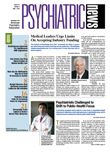Specific personality traits have already been linked with various brain functions. For example, impulsivity has already been linked with nerve activity in the limbic region and the nucleus accumbens/ventral striatum (Psychiatric News, March 6).
But specific personality traits are now being associated with nerve-fiber networks in the brain as well.
Michael Cohen, Ph.D., a postdoctoral researcher at the University of Arizona, and his colleagues in Germany used self-report questionnaires to determine the extent to which 20 healthy young adults possessed the personality traits of novelty seeking or reward dependence. The researchers then used a technique called diffusion tractography to infer the robustness of the nerve fibers that were visualized in the subjects' brains by magnetic resonance imaging. Finally, the researchers looked to see whether there was any association between the scores that subjects had obtained on novelty seeking or reward dependence and the robustness of particular nerve fibers in their brains.
There was, they found. Individuals who scored high on novelty seeking—that is, on impulsivity and the urge to seek out new and exciting things—had stronger nerve fibers connecting the ventral striatum with two limbic regions—the hippocampus and amygdala—than did individuals who did not score high on this personality trait. In contrast, individuals who scored high on reward dependence—that is, on the need for sociability and social approval—had stronger nerve fibers connecting the striatum and the prefrontal cortex than did individuals who did not score high on this personality trait.
So specific nerve-fiber tracts “may, in part, underlie human personality traits,” Cohen and his group concluded in the January Nature Neuroscience.
But do certain nerve-fiber tracts that are often used and thus strengthened lead to specific personality traits, or do specific personality traits lead to enhanced traffic in certain nerve fiber networks?
“Unfortunately, this type of 'chicken or egg' question is a very difficult one to answer,” Cohen told Psychiatric News.“ Both directions—brain connectivity leading to personality, or personality shaping brain architecture—are possible. It is likely a combination of both.”
In any event, “linking fiber pathways to personality traits opens new possibilities for understanding the neurobiological underpinnings of behavioral and social traits and may be useful for understanding the neurobiological correlates of clinical conditions, particularly those in which striatal circuitry has been implicated, such as major depression or substance abuse,” Cohen and his team stressed in their study report.
The study was funded by the University of Bonn in Germany.
An abstract of “Connectivity-Based Segregation of the Human Striatum Predicts Personality Characteristics” is posted at<www.nature.com/neuro/journal/v12/n1/abs/nn.2228.htm>.▪
